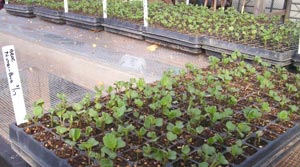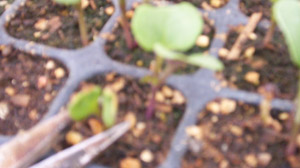

More Farm Metaphors For Writing: Thinning Seedlings
Mon 2010-04-05 21:37:46 (in context)
The broccoli were planted on March 17. Some twenty days later, they're getting their first real leaves. It's time to thin the seedlings.
Typically they're planted two per cell. Seedlings like to germinate in company. But they like to leaf out in private, so at this point we go through the trays and snip, snip, snip, leaving one sprout per cell. The remaining seedling flourishes, gladly filling out the freed-up space, and will be all the healthier when it's time to transplant them to the field.
This morning, I mostly just put the culled sprouts in a compost bucket. Some of them I ate. Broccoli sprouts are sharp and tasty, and the variety seen here is insanely nutritious. But last year, later in the season when we were thinning tomatoes, I saved six of the plants, pulling them out carefully rather than snipping their stems at the surface. I brought them home in small plastic pots filled with good Abbo soil mix, and I planted them in the self-watering bins on the balcony. And I enjoyed actual home-grown tomatoes for probably the first time since moving to Colorado.
Thinning seedlings could be seen as another (yet another) metaphor for writing. Ideas are a dime a dozen, but not every one of them turns into a story. You pick the one you can develop fully, leaving the others by the wayside. The more brain you spend on the one with potential, the better you do by it; whereas if you tried to give all your ideas equal attention and grow them all, they'll probably never get beyond that spindly, skeletal phase.
But unlike in farming, ideas you don't develop don't get snipped and tossed onto the compost. Well, they compost, yes, but that's where the metaphor breaks down; actual literal compost is composed of dead organic matter, where as composting ideas are very much alive, or perhaps pre-born. Anyway, the ideas that don't get developed now might come back with greater urgency and potential at a later date, having done some growing on their own when you weren't really looking at them. So it's less like this morning's broccoli culling and more like last year's tomato salvaging. Except the idea that gets transplanted is the one you choose, rather than the one you pass by.
Imagine if you could sort of put all your seed starts in stasis. Just, zap! all those 200 cells of broccoli go into suspended animation. Then you inspect them, each one of them, and you say, "That one. That one right there has potential." You gently uproot it and transplant it into its own cell, and then you hit the RESUME button. It grows and thrives and flowers. You enjoy a fantastic broccoli stir-fry. Then you go back to the seedlings in stasis and choose another.
It would be a terribly inefficient way to produce broccoli, unless I suppose you did this with three acre-long rows of broccoli at a time. But it's a pretty good way to write stories.